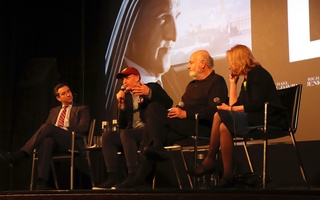In the opening scene of “Seven Psychopaths,” two gangsters discuss the statistical probability of shooting a person in the eyeball, eyeball-related torture, and “the chick-killing shakes.” A masked gunman casually strides up behind the pair and shoots them both in the head. This is Psycho No. 1.
Director and Screenwriter Martin McDonagh’s newest film, “Seven Psychopaths,” is a complex action-comedy where the driving characters, are all, as evidenced by the aforementioned scene, psychopaths. The single exception is the ostensibly sane though alcoholic Marty (Colin Farrell), who has no control over events whatsoever. Marty is a writer struggling to conjure up nutcase characters for his own screenplay—also called “Seven Psychopaths”—when his explosive friend Billy Bickle (Sam Rockwell) overhauls the creative process and Marty’s personal life. Billy has a couple of psychopathic tendencies of his own as well as a mobster’s missing shih-tzu on his couch, which precludes an increasingly chaotic spiral of flashbacks, headshots, imagined endings—and even a Yalie hooker and an out-of-context Vietcong. “Seven Psychopaths,” though dark, proceeds with a snappy wit that renders it consistently entertaining and never dolorous or dismal due to the comic talent and an avoidance of prolonged violence.
A fair amount of time is spent trying to work out who exactly the seven psychopaths are before just giving up and assuming everyone is crazy. However, the plot, though difficult at times, somehow works. While the movie is at once revenge flick, buddy comedy, mystery and voyage of self-discovery, the various strands fit together to make a slightly trippy ride. Granted, the overriding premise of a mobster turning LA upside down in search of a missing shih-tzu—three guesses why that breed was chosen—is absurd to begin with.
While the American setting is a departure from McDonagh’s earlier work, “Seven Psychopaths” does contain some of the same themes. The blends of immaturity and violence recall Farrell’s hitman role from “In Bruges,” and the tale of a man obsessed past the point of murder with a small domesticated animal is a feature from McDonagh’s play “The Lieutenant of Inishmore.”
The jokes, while tending to the puerile, are nonetheless hilarious. McDonagh, while producing a witty script, also gives great scope for his actors to display their comedic talent. Farrell is superb as the beleaguered Marty, all jerking shoulders and panicky eyes, moving from scene to scene with the look of a man who’s had something explode in his face. There is real brilliance in his interplay with the other primary characters, particularly Billy and Hans (Christopher Walken). Walken himself commands scenes with gravitas whether scattergun cussing or interacting with a hallucinogenic cacti. He captures both absurdity and subtle intensity with a soft-spoken and deeply convincing ease that belies his character’s far-fetched story.
It is, however, the cataclysmic butting of heads between Rockwell and Charlie Costello (Woody Harrelson) that drives the story. Despite not meeting until the final scene, a constant power struggle builds as the boundary between reality and Marty’s screenplay grows thin. Harrelson is at once petulant, pathetic, and occasionally terrifying. In one scene he ambles confusedly into a hospital ward with an enormous chrome handgun and creates an atmosphere of incredible tension simply by playing in a wheelchair and talking about his dog. As for Rockwell, his volatile, impulsive breed of psychopath can barely be described without spoilers.
On the writing side, McDonagh undoubtedly spins a tale that is fast paced and bloody but with a wit that sets it apart from the clumsy dialogue of many action films. The violence, while pervasive, is not gratuitous; there is an artistic quality to the splashes of blood—in this world it never dries or clots—and Hans’ shirt stays brightly splattered for days. There are repeating themes; the burning man, the murder of murderers, abandonment by women. It is not for nothing that Charlie trusts his dog more than his girlfriend. Even the characters themselves note the absence of significant female characters through the metatheatre of Marty’s screenplay—excepting Linda Bright Clay’s brief, impressive scene opposite Harrelson. In the words of the wonderfully controversial Billy, “You can’t let the animals die. Just the women.”
The themes of murder, suicide and revenge that McDonagh twists through the tales of the psychopaths have a haunting aftertaste, though they are shot with a briskness that defies gloom. Above all, however, it is the foul-mouthed, rollicking, spaced-out wit that makes “Seven Psychopaths” such a thoroughly entertaining film.
Read more in Arts
Affleck Defends Political Aims of ‘Argo’Recommended Articles
-
‘Rampart’ Explores Crime in L.A.Through a believable acting performance by Harrelson coupled with a satisfyingly complex script, “Rampart” serves as an interesting intellectual exercise yet stops short of being an emotional masterpiece.
-
"The Pillowman" Not for the SoftheartedWith precise performances and minimalist flair, Lily R. Glimcher ’14’s production of "The Pillowman" captures with equal success both the comic and the creepy aspects of the play. The result is a show that is simultaneously hard to watch and hard to tear oneself away from.
-
A Safer Wall StreetThe free market principles that have led to America’s global economic dominance remain intact. Unfortunately, nothing as complex as the trading that goes on in investment banks can be perfect. Money is even more powerful then you think.
-
 The Walking Dead: "East"
The Walking Dead: "East" -
 Woody Harrelson Speaks at Kirkland House
Woody Harrelson Speaks at Kirkland House













